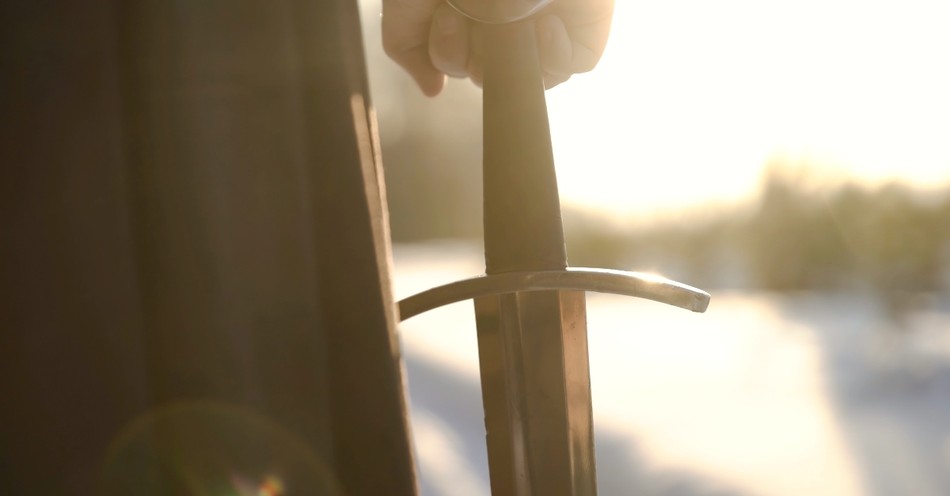Luke 22:36 is a Scripture that has evoked much debate among biblical scholars and Christians alike. Some believe that Jesus’ command to His disciples to “sell your cloak and buy a sword” entails metaphorical advice to prepare them for the perils of ministry after His crucifixion and ascension; others take this Bible verse literally as divine permission to carry arms and use them.
That being said, Jesus also encourages us in Matthew 16:24 to pick up our crosses, deny ourselves, and follow Him.
We cannot carry a cross and hold a sword at the same time, for the bearing of one contradicts the purpose of the other: The cross leads to eternal life, and the sword is a weapon that is wielded to ultimately end life.
Jesus is the Prince of Peace, who came to love, heal, and save us. He did not come to propagate violence.
Therefore, what is the meaning of Jesus’ statement in Luke 23:36?
Biblical Context to Luke 22:36
What is always helpful when studying Scripture is to look at the context it’s placed in, and Luke 22:36 is no exception to this.
At the beginning of this chapter, we learn that the Pharisees have been plotting Jesus’ death. Aware that His journey to the Cross is entering its final stage, Jesus tells His disciples to go and prepare the Passover meal for them in Luke 22:7-13, which would become known as the Last Supper (Luke 22:14-23).
Many wondrous events occurred that evening, which we have come to cherish today, such as Jesus’ proclamation of a New Convent between God and us and the taking of Communion. However, Jesus’ statement in verse 36 definitely comes as a shock to us.
“But now let the one who has a moneybag take it, and likewise a knapsack. And let the one who has no sword sell his cloak and buy one.”
If the disciples are also shocked by this command, they recover swiftly. In fact, they assure Jesus that they already have two swords in their possession (Luke 22:38).
Later that night, in the Garden of Gethsemane, Peter uses one of those swords to cut the ear of a servant of the High Priest when a mob led by Judas comes to arrest Jesus (Luke 22:50).
Was the shedding of blood in the Garden of Gethsemane intended as a warning for us to arm ourselves against the evil of this world? Is that why Jesus instructed the Twelve to acquire swords?
A Contradiction of Commands
Aside from the controversial directive to acquire weapons, Luke 22:36 contains further commands that contradict Jesus’ initial instructions to the disciples regarding ministry.
In Luke 9:3, Jesus tells the Twelve to “take nothing for the journey — no staff, no bag, no bread, no money, no extra shirt.” In Luke 10:4, He says, “Do not take a purse or bag or sandals; and do not greet anyone on the road.”
1. Why does He say this? In their first venture as representatives of Christ in the world, Jesus wants the disciples to not let concerns for their well-being or comfort distract them from achieving what He sends them out to do, which is to preach the gospel and report back to Him.
Additionally, Jesus is teaching the Twelve to trust and rely on God as their provider and protector.
However, in Luke 22:36, Jesus’ ministerial instructions take on a new direction. Now, the disciples are required to carry money, belongings, and the controversial sword.
2. What has changed? Jesus is going to the Cross. At the Last Supper, He is bidding farewell to the Twelve; at least, He is trying to because they don’t understand that He is going.
Jesus is teaching them that their faith in Him needs to be sufficient to survive without Him, and He is preparing them for the dangers of the world that await them.
In fact, Jesus warns Peter in Luke 22:31-34 that his faith will be tested three times before the rooster crows that day.
The Meaning Behind Luke 22:36
In order to understand Jesus’ words in Luke 22:36 more clearly, let us consider the following five points.
1. Not a literal sword. When Jesus urges His disciples to acquire a sword, He is not referring to a sword cast out of iron but rather a spiritual sword.
As Children of God, we are called to stand our ground in the battle between God and His army of angels and the legions of demons led by the Accuser, Satan (Ephesians 6:12).
As part of our battle stance, we are required to put on our spiritual armor (Ephesians 6.13), of which the sword, the Word of God, is a part (Ephesians 6:17).
Jesus was warning the disciples that the perils that await them would not be man-made but rather spirit-induced: in order to protect themselves from evil and penetrate the darkness of a broken world, they would need to have a firm foundation of the Word of God.
2. Luke 22:36 is a fulfillment of Scripture. After commanding the disciples to purchase a sword, He immediately tells them why in Luke 22:37: “It is written: ‘And he was numbered with the transgressors’, and I tell you that this must be fulfilled in me. Yes, what is written about me is reaching its fulfillment.’”
The prophecy that Jesus requires to be fulfilled is in Isaiah 53:12 states, “and was numbered with the transgressors.”
The swords were required to help give the appearance that Jesus was the leader of a revolutionary political mob and thereby allow the Jewish authorities to feel justified in arresting Him.
Maybe this explains why Jesus replied with “that is enough” in Luke 22:38 upon hearing that the disciples already possessed two swords: their purpose was for show, not for action. (Alternatively, He may have been frustrated with their resolute tendency to accept His teachings literally).
3. Jesus rebukes Peter for wielding a sword. When Peter attempts to prevent Jesus’ arrest in the Garden of Gethsemane, he takes Jesus’ instructions to carry a sword literally and cuts off Malchus’ right ear (John 18:10).
However, instead of thanking Peter for protecting Him, Jesus gives His disciple His own earful — of chastisement! “‘Put your sword back in its place,’ Jesus said to him, ‘for all who draw the sword will die by the sword” (Matthew 26:52). Additionally, He heals Malchus’ ear.
This is a further example of Jesus’ character who loves His enemies, seeks to heal, and abhors violence.
4. Jesus has angelic backup. Though Jesus and the remaining 11 disciples have two swords between them after Judas betrays His Master to the Jewish authorities, the Master remains unconcerned.
Why? Jesus has an angelic army at His disposal! “Do you think I cannot call on my Father, and he will at once put at my disposal more than twelve legions of angels?” (Matthew 26:53).
In the Roman army, a legion was the largest division containing up to 6000 soldiers. This means that Jesus could call up 72,000 angel warriors at His will.
If that’s the case, who needs two swords?
5. Jesus wields the sword of the spirit. As we read earlier, the sword that Jesus commands His disciples to acquire is not an iron sword but the Sword of the Spirit, which is the Word of God.
It is no coincidence that Jesus chooses the sword as His spiritual weapon of choice. Firstly, the sword is the Truth, and Jesus is the Truth that sets us free (John 8:32).
Secondly, Scripture reveals that Jesus wields the Sword of the Spirit to combat the forces of darkness. In Matthew 4:1-11, Jesus uses the Word of God to put Satan in His place when he comes to tempt Him.
Additionally, in Revelation 19:15, it is prophesied that “coming out of his mouth is a sharp sword with which to strike down the nations.”
What is so beautiful about the imagery of a sword-bearing Jesus is that it underlines His act of sacrificial love toward us on the Cross of Calvary when He confronted and won over the powers of darkness to pay for our sins with His blood.
In some countries, human law condones the carrying of arms; however, the law of the Kingdom of Heaven dictates that we should love one another unconditionally as Jesus loves us (John 15:12).
What Does This Mean?
Therefore, instead of reaching for your two swords as the disciples did, instead, reach for the two-edged sword of the Word of God, whose sharpness can penetrate the deepest darkest wounds of a broken world and expose it to the redemptive light of Jesus Christ.
For further reading:
Is it True if You Live by the Sword You Will Die by the Sword?
How Do We Use the Sword of the Spirit in the Armor of God?
What Can We Learn from the Rich Young Ruler?
Photo Credit: ©iStock/Getty Images Plus/Media Whalestock

Madeline Kalu is an Australian Christian writer and the co-founder of Jacob’s Ladder Blog and The Proverbs 31 Home. She is also the co-author of the “My Year of Miracles 2024” journal, which encourages a daily reflection on the miracles that God performs in our lives throughout 2024. Madeline lives in Germany with her husband Solomon and the family’s two cats, who were rescued from the Ukrainian war zone.



